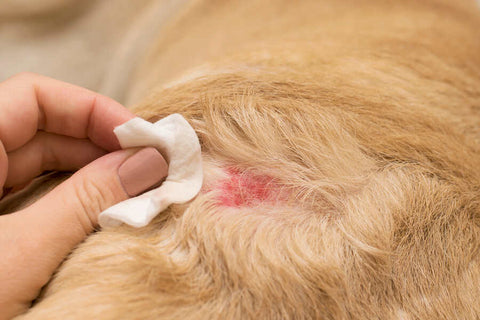
Coconut oil offers potential advantages for dogs, similar to its benefits for humans. Nevertheless, it's crucial to assess these benefits in the context of potential risks for both species. Whether it's alleviating digestive discomfort, providing relief for irritated skin, preventing infections, or reducing allergic reactions, coconut oil for dogs has exhibited noteworthy advantages.
Research has suggested that coconut oil for dogs can enhance nutrient absorption, counteract digestive issues such as inflammatory bowel syndrome and colitis, and mitigate overall bodily inflammation. However, it's important to exercise moderation in how to use coconut oil for dogs to its elevated saturated fat content.
Coconut oil can potentially enhance the appeal of your dog's kibble. Thanks to its medium-chain fatty acids (MCFAs), this oil is swiftly absorbed into the gastrointestinal tract and undergoes direct processing in the liver.
Certain studies conducted in humans and rodents have indicated that a diet containing MCFAs may contribute to reducing fat storage and possibly serve as a preventive measure against weight gain, all while supplying an extra energy source.
Ways to Administer Coconut Oil to Dogs
1. In Food

Start with a conservative amount, not exceeding a quarter teaspoon for smaller breeds, while larger dogs can handle up to one tablespoon. Be mindful of your pet's weight and breed predisposition to pancreatitis, as excessive saturated fat in coconut oil can lead to weight gain when used inappropriately.
According to the ASPCA, modest consumption of coconut and coconut-based products is typically safe to experience the benefits of coconut oil for dogs, with no significant harm reported. Nonetheless, oils derived from fresh coconuts' flesh and milk may result in stomach upset, loose stools, or diarrhea. Therefore, exercise caution when using coconut oil.
Opt for organic, virgin, cold-pressed coconut oil, and discontinue its use if you observe any signs of digestive discomfort, such as diarrhea or allergic reactions. In the event of an adverse reaction to coconut oil, alternative options like salmon oil and flaxseed oil, rich in omega-3 fatty acids, can provide similar benefits.
Alternatively, you can choose diets like Fidele+ dog food that already have precisely calculated amount of coconut oil for dogs of different ages and size.
2. Applying Coconut Oil to Your Dog's Skin

Much like with humans, using coconut oil for dog skin can offer vital skin lubrication, particularly during harsh winter months, to prevent flaking and other signs of irritation. For dogs already experiencing dry skin or dandruff, coconut oil can boost the lipid levels on the skin's surface.
For those living in wooded areas or frequently taking their dogs on hikes, coconut oil can also serve as a natural repellent against fleas and ticks, safeguarding your pet from potential diseases.
How to Apply
To apply, simply rub a small amount of coconut oil into your hands and gently massage it into your pet's skin, running your fingers through their fur. This not only aids in skin health but also imparts a sleek and glossy appearance to your dog's coat. Be prepared for the possibility that your dog might lick themselves more frequently after application.
3. Using Coconut Oil for Medication

Administering medication to your dog, especially when they've become pill-savvy, can be quite a challenge. If your dog detects the pill hidden within that tempting glob of peanut butter and refuses to cooperate, coconut oil can be a nifty trick to encourage pill consumption. When used as a coating on pills, it can make the medicine more appealing, making it easier for your pet to swallow.
Coconut oil for dogs is, thus, a great way to encourage them to consume pills.
4. Using Coconut Oil for Minor Wounds

Coconut oil is celebrated for its natural antibacterial, antiviral, and antifungal properties. This makes it an excellent choice for treating minor wounds, such as cracked paw pads, minor cuts, or areas of skin irritation. One of the benefits of coconut oil for dogs, thus, is that acts as a natural topical antimicrobial to promote healing and alleviate discomfort. However, it's important to avoid using coconut oil on open wounds that are bleeding or oozing pus, in which case you should promptly consult your veterinarian for proper treatment.
For dogs with seasonal allergies leading to irritation from chewing and scratching, coconut oil may provide some relief when applied to the affected areas. Keep in mind that while it may alleviate discomfort, some dogs might be inclined to lick and chew even more when coconut oil is used.
5. Coconut Oil for Dental Care

Leverage the antimicrobial properties of coconut oil to maintain your pet's oral hygiene. Research in humans has shown that toothpaste infused with oil can offer similar benefits to the traditional practice of oil pulling. Toothpaste containing coconut oil can effectively eliminate harmful bacteria in the mouth and deter plaque formation, a precursor to dental issues. You can either mix a small amount of oil with your dog's toothpaste or apply it directly to their teeth, following the same procedure as you would with commercial dog toothpaste.

In conclusion, coconut oil for dogs offers potential benefits, with research indicating its positive effects on digestion, skin health, and overall well-being. It's important to use it in moderation due to its high saturated fat content. When incorporating coconut oil into your dog's diet, start with small amounts, and consider your pet's weight and susceptibility to pancreatitis. Coconut oil can also be applied topically to soothe skin issues, but avoid using it on open wounds that are bleeding or oozing pus. Additionally, it can serve as a palatable coating for pills, making medication easier to administer. Lastly, coconut oil for dogs can be a useful component of their dental care routine, with its antimicrobial properties helping to maintain oral health and prevent plaque formation.



